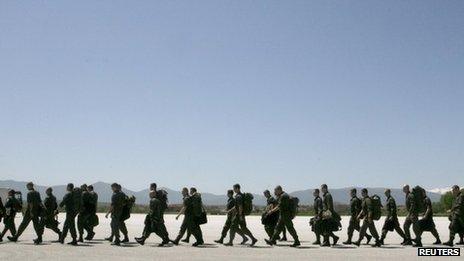Nato: What is it for?
- Published

Many Nato soldiers will leave Afghanistan next year - but where will they go next?
The main purpose of the latest Nato summit is to emphasise that the organisation's longest, biggest ever operation is nearly at an end.
They will announce that next year will be a "milestone" when the lead combat role is handed over to Afghan forces.
The purpose is to stress that for the West, the fighting will soon be over. But we aren't leaving. It is a delicate, difficult balance. But that is for tomorrow.
Today the alliance is talking about more existential questions - why are we here? What are we for?
Freed from MAD
It is a question Nato has been forced to ask before. After all, it was set up as a counterweight to the Soviet Union's military might.
When that empire crumbled, it cast around for a new role and found it in expansion and absorption of many of the old Warsaw Pact, external.
But the end of the old Cold War stand off meant more. It unleashed Nato from the caution imposed by Mutually Assured Destruction and meant it could go to war.
It did so in a limited way as the former Yugoslavia disintegrated. It did so in Afghanistan, invoking for the first time Clause Five, external, which states as its main purpose: if one member is attacked, it should be treated as an attack on all.
But in two years time Afghanistan will be over, and Nato will be looking for a role.
It will be doing so as the European economic crisis means governments are keen to cut their armed forces.
It does so as the United States turns its attention to Asia, external. The South Pacific is a more likely area of conflict, external than the North Atlantic.
Nurturing Nato
Nato could draw its horns in and stick to its stated responsibility to safeguard its members' freedom. While Russia, external is no longer an enemy, it is not exactly a trusted friend.
After all, a coming Nato operation, Steadfast Jazz, external, imagines the invasion of the Baltics by powers unknown.

Some see Nato as a force for good, others argue it promotes US imperialism
But this will not be enough.
Libya was a striking example of Nato as an instrument of liberal interventionism, external, the belief that democratic nations have a duty to aggressively promote their values and protect human rights.
Some, although few within Nato itself, want that repeated in Syria., external To many on the left this is just another threadbare disguise for American imperial power, external.
Call it what you will, it is certainly a role that would keep Nato busy. But it is hardly likely to become an explicit purpose.
However, Nato will be nurtured. For those who believe that American power is a good in the world, external it is an essential tool. They won't allow it to rust.